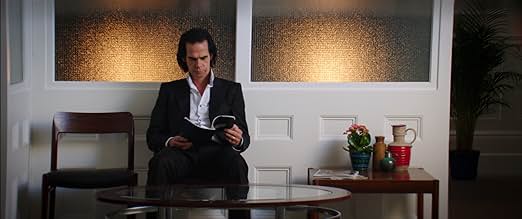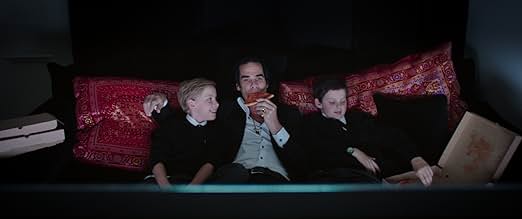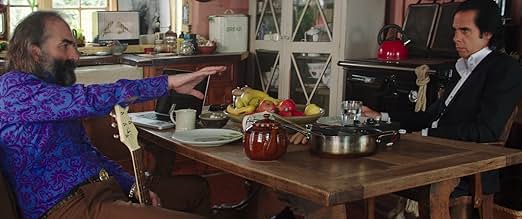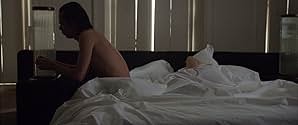Writer and musician Nick Cave marks his 20,000th day on the planet Earth.Writer and musician Nick Cave marks his 20,000th day on the planet Earth.Writer and musician Nick Cave marks his 20,000th day on the planet Earth.
- Directors
- Writers
- Stars
- Nominated for 1 BAFTA Award
- 8 wins & 18 nominations total
Susie Bick
- Self - Susie Cave
- (as Susie Cave)
- Directors
- Writers
- All cast & crew
- Production, box office & more at IMDbPro
7.412.2K
1
2
3
4
5
6
7
8
9
10
Featured reviews
Learn about the artistic process and a gifted writer/rocker.
". . . The never-ending drip feed of eroticism" Nick Cave
I'm not sure either what that quote means, but what you may get is a sense of writer/musician Nick Cave's poetic inclinations and the sensuality of his life, encapsulated in a fictional day, his 20,000 day on earth to be specific. Starring him, of course, because he is the center of his universe, and he believes, maybe a deity or an angel. He once said about his creations: "I can't explain that dividing line between nothing and something that happens within a song, where you have absolutely nothing, and then suddenly you have something. It's like the origin of the universe."
This smooth fictional biography, partially narrated by Cave, first takes us in his fine car, which he always drives, to visit his therapist (scene so relaxed and interesting I wish we could have heard the results). Then lunching with band mate Warren Ellis, where the talk is mostly music, and over to an archive brimming with his memorabilia.
Interspersed are performances with The Bad Seeds, from his almost Leonard Cohen-like poetic music to his Jagger-like rocking in Sydney (he's an Aussie), where the capacity crowd is fully under his spell. As he speaks through the music about its transforming power, he also shows us his struggle to bring poems and lyrics together. He once said about author vs. musician: "Musicians are at the bottom of the creative pyramid and authors are at the top, and many people think it's unacceptable for someone to attempt to jump from the bottom to the top of the pyramid."
Along the way we see him and his sons eat pizza and watch Scarface. Although he seems to have little time for his family, when he does, it's relaxed just the way he presents himself to us in a film that gives much more insight into an artist's creative process than we usually get with bios.
"My music has to do with beauty, and it's intended to, if not lift the spirits, then be a kind of a balm to the spirits." Nick Cave
I'm not sure either what that quote means, but what you may get is a sense of writer/musician Nick Cave's poetic inclinations and the sensuality of his life, encapsulated in a fictional day, his 20,000 day on earth to be specific. Starring him, of course, because he is the center of his universe, and he believes, maybe a deity or an angel. He once said about his creations: "I can't explain that dividing line between nothing and something that happens within a song, where you have absolutely nothing, and then suddenly you have something. It's like the origin of the universe."
This smooth fictional biography, partially narrated by Cave, first takes us in his fine car, which he always drives, to visit his therapist (scene so relaxed and interesting I wish we could have heard the results). Then lunching with band mate Warren Ellis, where the talk is mostly music, and over to an archive brimming with his memorabilia.
Interspersed are performances with The Bad Seeds, from his almost Leonard Cohen-like poetic music to his Jagger-like rocking in Sydney (he's an Aussie), where the capacity crowd is fully under his spell. As he speaks through the music about its transforming power, he also shows us his struggle to bring poems and lyrics together. He once said about author vs. musician: "Musicians are at the bottom of the creative pyramid and authors are at the top, and many people think it's unacceptable for someone to attempt to jump from the bottom to the top of the pyramid."
Along the way we see him and his sons eat pizza and watch Scarface. Although he seems to have little time for his family, when he does, it's relaxed just the way he presents himself to us in a film that gives much more insight into an artist's creative process than we usually get with bios.
"My music has to do with beauty, and it's intended to, if not lift the spirits, then be a kind of a balm to the spirits." Nick Cave
Any creative person needs to watch this film
Any creative person needs to see this. Musician, writer, anything, if this film doesn't inspire you, then it will surely influence. Personally, Cave's very frank and fascinating philosophies on the creative process were stirring, moving even, especially when one of these ideas is laid out in the narration and followed by a very up close and personal live performance. Or, a ten minute, uninterrupted sequence of the band jamming out a song. It was in that latter scene you can see the conducting skills Cave possesses, as while playing the piano he is leading the band into the song's dips and crescendos. This look into the journey an idea goes on until it becomes a story, or a song in this instance, is almost intimate and extremely honest, while still managing not to spill too many beans. The unconventional nature of the film helps this aspect.
I really do think that if you write or create in any way, watch this film as soon as you can. I'm having to stop myself from going to see it again three days after i saw it. Note: this is not a documentary, but it isn't a movie either, as you'd normally think of it anyways. This film is most certainly unique, and one of the most thought provoking pieces of art that I ever ever seen, read or heard. Even his conversation with pop-singer Kylie Minogue (sp?) was interesting, as they candidly discuss different issues related to performing on a stage.
Not much action physically, but the way Cave is so spiritual about how he see and treats the creative process makes every second riveting. I didn't want it to end. For me, this was inspiring on a level that I have never felt before.
I really do think that if you write or create in any way, watch this film as soon as you can. I'm having to stop myself from going to see it again three days after i saw it. Note: this is not a documentary, but it isn't a movie either, as you'd normally think of it anyways. This film is most certainly unique, and one of the most thought provoking pieces of art that I ever ever seen, read or heard. Even his conversation with pop-singer Kylie Minogue (sp?) was interesting, as they candidly discuss different issues related to performing on a stage.
Not much action physically, but the way Cave is so spiritual about how he see and treats the creative process makes every second riveting. I didn't want it to end. For me, this was inspiring on a level that I have never felt before.
Is this the greatest ever music movie? Maybe.
Nick Cave is a very special musician. In fact musician may be the wrong descriptor.
He's a very special writer that specialises in music. He has Warren Ellis and his many collaborators to dial up the music side of the equation.
in this documentary, that looks like a movie, that, yes, he co-wrote, you find yourself immersed in the mind of a genius for an hour and a half as he discusses his life, his loves, his inspirations and his deep internal psychology in something approaching forensic detail.
He is a very beautiful man.
He talks painfully honestly at times about everything that is true to him. His 'muse' - his wife Susie who lies, back turned to camera in bed with him as the film opens.
We see half glimpses, stolen moments, of her off and on through the film but little more. We see a photo of her projected on the wall of his archivist's office.
She is as beautiful as he is.
Later we see Cave guzzle pizza with their twin sons, arm around the shoulders of one of them, devoid of comment/emotion, almost voyeuristically. It also spells L.O.V.E.
We see him kiss Warren Ellis full square on the lips as he visits his musical 'muse' on the occasion of a casual lunch of eels in black pasta. More love.
Cave carries an aura of love around with him. Yet he's often labelled with hate (partly because of the baggage of The Birthday Party have burdened him with. Grinderman, in this respect cannot help.)
We see him in the recording studio.
Gold dust. (Watching drummer Thomas Wydler as he twitches and mouths the rhythms is mesmeric.)
We see him crafting lyrics.
Gold dust. (His notebooks are works of art in their own right.)
We see him performing live.
Now, this is the thing. Anyone who has been to a Nick Cave and the Bad Seeds gig knows that no band on earth put in the same level of emotional commitment to their music; (perhaps with the exception of his faux-misogyny project Grinderman) Ellis all crazy violin fury, Cave all emotional connection.
It's this latter point that made the movie for me. He talks about how he ensnares individual audience members and then demonstrates it with a live performance of Higgs Boson Blues that reduced his female 'victim' to tears.
Me too. It was all too much. All too emotionally engrossing.
And then there's the craft...the soundtrack (obviously) the direction and the cinematography are all sublime. A special shout out has to go for editor, Jonathan Amos.
And the cameos; Kylie, Ray Winstone and Blixa Bargeld.
I'm left with a tantalising question. Is this the greatest film ever made about music?
I think it has claims on that. Notwithstanding School of Rock.
Nick Cave. {I love you man.)
He's a very special writer that specialises in music. He has Warren Ellis and his many collaborators to dial up the music side of the equation.
in this documentary, that looks like a movie, that, yes, he co-wrote, you find yourself immersed in the mind of a genius for an hour and a half as he discusses his life, his loves, his inspirations and his deep internal psychology in something approaching forensic detail.
He is a very beautiful man.
He talks painfully honestly at times about everything that is true to him. His 'muse' - his wife Susie who lies, back turned to camera in bed with him as the film opens.
We see half glimpses, stolen moments, of her off and on through the film but little more. We see a photo of her projected on the wall of his archivist's office.
She is as beautiful as he is.
Later we see Cave guzzle pizza with their twin sons, arm around the shoulders of one of them, devoid of comment/emotion, almost voyeuristically. It also spells L.O.V.E.
We see him kiss Warren Ellis full square on the lips as he visits his musical 'muse' on the occasion of a casual lunch of eels in black pasta. More love.
Cave carries an aura of love around with him. Yet he's often labelled with hate (partly because of the baggage of The Birthday Party have burdened him with. Grinderman, in this respect cannot help.)
We see him in the recording studio.
Gold dust. (Watching drummer Thomas Wydler as he twitches and mouths the rhythms is mesmeric.)
We see him crafting lyrics.
Gold dust. (His notebooks are works of art in their own right.)
We see him performing live.
Now, this is the thing. Anyone who has been to a Nick Cave and the Bad Seeds gig knows that no band on earth put in the same level of emotional commitment to their music; (perhaps with the exception of his faux-misogyny project Grinderman) Ellis all crazy violin fury, Cave all emotional connection.
It's this latter point that made the movie for me. He talks about how he ensnares individual audience members and then demonstrates it with a live performance of Higgs Boson Blues that reduced his female 'victim' to tears.
Me too. It was all too much. All too emotionally engrossing.
And then there's the craft...the soundtrack (obviously) the direction and the cinematography are all sublime. A special shout out has to go for editor, Jonathan Amos.
And the cameos; Kylie, Ray Winstone and Blixa Bargeld.
I'm left with a tantalising question. Is this the greatest film ever made about music?
I think it has claims on that. Notwithstanding School of Rock.
Nick Cave. {I love you man.)
Interesting and engaging, but needed a little more focus and guidance.
I really like Nick Cave. He has cameos in two of my all-time favourite films, The Assassination of Jesse James and Wings of Desire. His score for the former is my all-time favourite too, a collaboration with Warren Ellis of whom he's seen hanging out together here. This documentary, 20,000 Days On Earth, is perhaps coming a little too late or early to paint the most fascinating portrait of the rock artist, though it would have been a less catchy title. His last album is good, not great, perhaps played a little too safe. Nevertheless, his creative process is still interesting to watch as we're allowed access into the recording studio. But this isn't a straightforward documentary. It has bits of verite, fiction and interviews.
It's a shame the fiction isn't as well handled and it comes off as contrived and stilted, including when the mystical celebrity cameos keep Cave company in car journeys. It's the way the film is shot too which uses the type of photography that's fit for HD TV rather than cinema though it has its moments. However, it makes up for all that for being very insightful. The interviews are no holds barred with penetratingly honest questions. Cave explains that his biggest fear is losing his memory, and I wish the film took that as its primary thesis, looking into Cave's memory instead of an irreverent day in the life. It does have its trips into nostalgia and excels in those moments. 20,000 Days On Earth is still a very good doc thanks to its subject matter, but it needed more focus and guidance.
7/10
It's a shame the fiction isn't as well handled and it comes off as contrived and stilted, including when the mystical celebrity cameos keep Cave company in car journeys. It's the way the film is shot too which uses the type of photography that's fit for HD TV rather than cinema though it has its moments. However, it makes up for all that for being very insightful. The interviews are no holds barred with penetratingly honest questions. Cave explains that his biggest fear is losing his memory, and I wish the film took that as its primary thesis, looking into Cave's memory instead of an irreverent day in the life. It does have its trips into nostalgia and excels in those moments. 20,000 Days On Earth is still a very good doc thanks to its subject matter, but it needed more focus and guidance.
7/10
Very well put together documentary! 7/10
Review: I really liked the documentary about the weird and wonderful mind behind Nick Cave's work which began in 1973, when I was born, and he is still coming out with music today. He became a chart topping artist when he made the song with Kylie Minogue called Where The Wild Roses Grow but he has mostly stayed underground with a selective audience. The Australian born 57 year old has a very a different look in life, which you will see in this documentary and his music comes from a place which is unique and very complex. This documentary is extremely well put together and it shows different sides of his life, even though it's only based on one day. I must admit, I had only heard a couple of songs from this artist before I watched this documentary but now that I have seen it, I am intrigued about his earlier work. The epic ending song, which I can't help rewinding, is really impressive because of the violins and kids singing. It made me laugh when he was sitting with his young kids, eating a pizza and watching Scarface, which is politically incorrect for this day and age but that just shows that Nick Cave really isn't bothered with those type of things. I wish that more artist would come out with documentaries like this because it will make them seem more human and you'll be able to see the process behind there writing and musical methods. There is a part in the documentary were he goes through his personal pictures which would also be great to see from other artists at different periods of there life. Personally, I watched this movie on TV and then I rented it the next day because I couldn't get the ending song out of my mind so I'm obviously impressed with this film. You don't have to be a Nick Cave fan to enjoy this documentary because of the different elements that it covers so I will highly recommend it to people who want to see a day in a life of an artist . Enjoyable.
Round-Up: I was shocked to see Ray Winstone in this movie. I couldn't really see why he was in this film and it was a bit strange when he was asking Nick Cave some questions and he wasn't answering them but the natural conversation in the car seemed very realistic. I was also surprised to see Kylie Minogue in the film and the conversation between the two of them in the car was a great insight into a period in his life when there collaboration exploded on the music scene. The interview with the psychologist, also gives you an insight into his strange upbringing and the relationship with his father which shows a more personal side to Nick Cave. I do find his lyrics a bit weird and very Jim Morrison like but he is an unique artist who doesn't get the recognition that he deserves because he doesn't follow trends and he stays true to his music.
Budget: N/A Worldwide Gross: $2million
I recommend this movie to people who are into their biopics about a day in the life of Nick Cave. 7/10
Round-Up: I was shocked to see Ray Winstone in this movie. I couldn't really see why he was in this film and it was a bit strange when he was asking Nick Cave some questions and he wasn't answering them but the natural conversation in the car seemed very realistic. I was also surprised to see Kylie Minogue in the film and the conversation between the two of them in the car was a great insight into a period in his life when there collaboration exploded on the music scene. The interview with the psychologist, also gives you an insight into his strange upbringing and the relationship with his father which shows a more personal side to Nick Cave. I do find his lyrics a bit weird and very Jim Morrison like but he is an unique artist who doesn't get the recognition that he deserves because he doesn't follow trends and he stays true to his music.
Budget: N/A Worldwide Gross: $2million
I recommend this movie to people who are into their biopics about a day in the life of Nick Cave. 7/10
Did you know
- Crazy creditsThe credits are shown over a twilight scene of Brighton, shot from the sea.
- ConnectionsFeatures The Passion of Joan of Arc (1928)
- SoundtracksCan't Get You Out of My Head
Written by Cathy Dennis and Rob Davis (as Robert Davis)
Performed by Kylie Minogue
Published by EMI Music Publishing Ltd and Universal/MCA Music Ltd
Licensed courtesy of Parlophone Records Ltd
- How long is 20,000 Days on Earth?Powered by Alexa
Details
- Release date
- Countries of origin
- Official sites
- Language
- Also known as
- Dünyada 20,000 Gün
- Filming locations
- Production companies
- See more company credits at IMDbPro
Box office
- Gross US & Canada
- $279,558
- Opening weekend US & Canada
- $27,879
- Sep 21, 2014
- Gross worldwide
- $2,128,486
- Runtime
- 1h 37m(97 min)
- Color
- Sound mix
- Aspect ratio
- 2.35 : 1
Contribute to this page
Suggest an edit or add missing content































